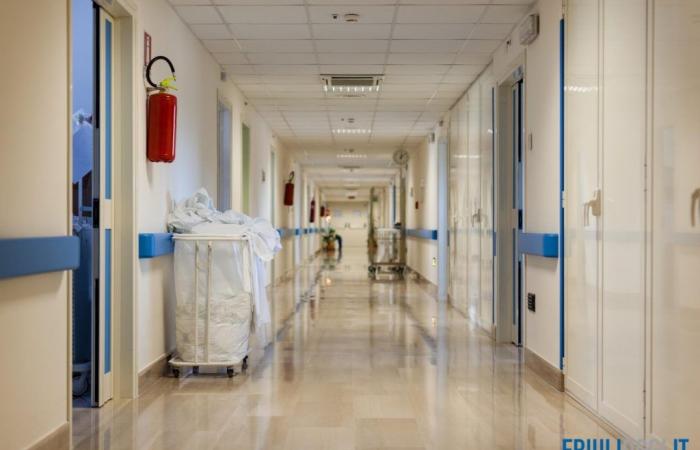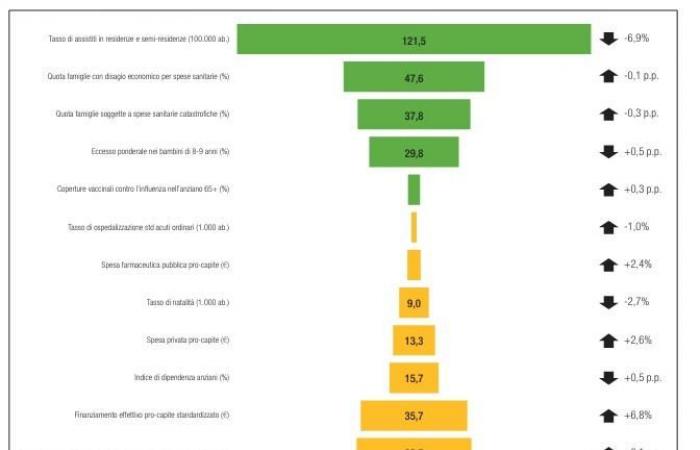The data from the Crea Sanità report promotes Fvg, but only with ‘sufficiency’. The CGIL criticizes councilor Riccardi
Time for evaluations for the regional health system. After the – positive – data released yesterday by the report from the Sant’Anna School of Pisatoday is the time of the Crea Sanità survey (Il Sole 24 Ore Radiocor), who photographs the population’s satisfaction index with respect to the protection of their health.
Based on the analysis, only Veneto, Piedmont, Bolzano and Tuscany (over 13.3 million inhabitants) they get a full promotionwith overall levels of health protection better than the others and with a performance index that exceeds 50% of the maximum level (60%, 55%, 54% and 53% respectively).
For users, the Fvg healthcare system only gets a passing grade
Friuli Venezia Giulia, Trento, Emilia-Romagna, Liguria, Valle d’Aosta, Marche and Lombardy (19.3 million inhabitants) are promotedbut with the ‘enough‘ which configures performance levels between 45 and 50 percent.
‘Postpone‘, with levels between 37% and 44%, Sardinia, Campania, Lazio, Umbria, Abruzzo and Puglia (approximately 18.9 million inhabitants). Strongly insufficientIn the end, Sicily, Molise, Basilicata and Calabria (about 7.5 million inhabitants).
Data, therefore, which gives rise to discussion and which goes against the trend compared to the improving performances analyzed with satisfaction yesterday by the regional health councilor Riccardo Riccardi.
The CGIL FVG intervenes in controversy on the statements of councilor Riccardi
“The emphasis with which the councilor commented the new rating assigned to Friuli Venezia Giulia by the 2023 report of the Sant’Anna School of Advanced Studies in Pisa is surprisingbecause Riccardi’s words do not take into account the fact that from 2017 to 2023again according to Sant’Anna data, our region has fallen to the bottom of almost every statistic not only in comparison between the regions, but also with respect to the standards that guarantee the protection of the right to health”, attacks the general secretary of the CGIL Friuli Venezia Giulia, Michele Pigawhich he throws a new alarm on the growth of waiting lists.
Waiting lists are constantly getting worse
“When a glass is half full it is normal for a confrontation to arise between those who see it half full and those who see it half empty. But if the glass is almost completely empty, there should be no discussion.” So Piga, who points the finger at the absence of signs of improvement in terms of waiting timesjudged “unacceptable and worsening””” in many important areas, starting from oncological surgery: “Almost 40% of patients awaiting surgery – Piga reports – must wait beyond the deadline to be operated onwith peaks reaching up to 76% for prostate cancer”””.
The data on waiting times for outpatient specialists are also alarming for the secretary of the CGILincluding diagnostic investigations“which are even getting longer compared to the Covid period, even reaching in some cases a dramatic ballet of unavailable agendas”.
“In just over five years – notes Piga – we went from 19% (2018 data) to 33% of outpatient services provided in addition to tolerated waiting times. Percentage that rises further for short priority services, delivered late in 50% of cases, rising to 20% in 2018. All this generates indignation in the citizens errepeated findings by analysis instituteswhich illustrate a situation that is now unsustainable for regional healthcare”.
The glass has never been so empty
“The glass has never been so empty, so there is really nothing to rejoice about“, attacks the secretary of the CGIL, who concludes by recalling how it is up to the public service to take charge of the services not provided and “delegated” to the private sector. “With regards to refunds – he declares – the citizen should not be the one to look for the private provider on his own, pay him and ask for reimbursement: it is up to the Health Authority to guarantee the service to the citizen, supplying it themselves or purchasing it from private operators. The citizen is only responsible for any ticket, if due.”







